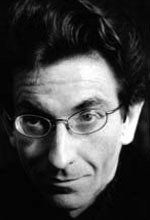Continuum Ensemble, Headlam, Kings Place | reviews, news & interviews
Continuum Ensemble, Headlam, Kings Place
Continuum Ensemble, Headlam, Kings Place
Exploring forgotten music theatre of the Weimar Republic

Zeitoper, single scene micro-opera for modern times, enjoyed a brief vogue in the Weimar era, but disappeared as fast the Republic itself. This programme from the Continuum Ensemble resurrected four examples, all from the years 1927-28, to offer a snapshot of Germany’s quickly evolving music theatre scene between the wars. The works, by Hindemith, Ernst Toch and Kurt Weill, are short, with little narrative, and even less musical subtlety.
Hindemith and Toch take aim at 19th-century melodrama in their short satires. In Hindemith’s Hin und Zuruck, here sung in English as There and Back, a cheerful conversation between a husband and wife descends into a quarrel, and then a shooting. The sheer speed at which this occurs is absurd enough, but to drive the point home, the ending of the piece plays out the whole story in reverse – ensuring an automatic happy ending. Through all this, Hindemith writes colourful, energetic music, continuously propelled by two percussive piano parts, churning away behind the wind-heavy chamber ensemble.
Toch takes a similar tack in Egon and Emilie (again sung in English translation). His disputing couple are Egon, who won’t speak, and Emilie, who won’t stop. She sings throughout, in florid coloratura, imploring him to respond. Here again, the music is deliberately unsubtle, a clarinet-heavy ensemble delivering angular, bitonal harmonies. But the instrumental parts also contribute to the comedy, interrupting the flow and reducing to incessantly repeating figures every time Emilie stops to expectantly await a response.
More serious fare from Kurt Weill opened the second half, his Vom Tod im Wald, a bass scena originally intended for his Berliner Requiem. The sombre mood is set from the start by the two trombones and continued by the bass soloist (Barnaby Rea) and the woodwind and brass ensemble, with evocative contributions from a harmonium. This was the most emotive piece here, and also the most sophisticated, though in the context it was difficult to hear either qualities as a virtue.
 Mahagonny Songspiel ended the programme. This was Weill’s trail run for the more extended Rise and Fall of the City of Mahagonny three years later. The Songspiel is for six singers and 11 instrumentalists. The singers all take named roles, but perform more as an ensemble than as soloists. Most of the music sounds jazz-inspired, but the sources are always kept at arm’s length, with Weill continually complicating the rhythms (even those on the drum kit) and introducing dense, austere harmonies.
Mahagonny Songspiel ended the programme. This was Weill’s trail run for the more extended Rise and Fall of the City of Mahagonny three years later. The Songspiel is for six singers and 11 instrumentalists. The singers all take named roles, but perform more as an ensemble than as soloists. Most of the music sounds jazz-inspired, but the sources are always kept at arm’s length, with Weill continually complicating the rhythms (even those on the drum kit) and introducing dense, austere harmonies.
Staging here was limited. Earlier some arm actions served for the Hindemith and there were a dramatic entrance and exit in the Toch. But that was as much as either of those works needed. Mahagonny seemed all the more provisional for its rigid concert performance, but again, drama seemed beside the point. The generally young Continuum Ensemble gave proficient performances, giving each of these scores their due measure of colour and energy. Mahagonny sagged a little towards the end, though, with the players losing the crispness and edge that had made the Hindemith in particular such a success. Vocal performances were all strong. Donna Bateman was suitably over-wrought as Toch’s Emilie, and Barnaby Rea appropriately dark-toned in Vom Tod in Wald. The pick of the voices, though, was Anna Dennis, both as the wife in the Hindemith and as Bessie, the soprano role in Mahagonny. Meanwhile, top honours go to Philip Headlam (pictured above), not only for his proficient conducting but also for instigating and programming this concert and the Swept Away season of which it is a part. Further concerts this weekend explore more music from these composers, as well as Krenek, Wolpe and Schulhoff.
rating
Explore topics
Share this article
The future of Arts Journalism
You can stop theartsdesk.com closing!
We urgently need financing to survive. Our fundraising drive has thus far raised £49,000 but we need to reach £100,000 or we will be forced to close. Please contribute here: https://gofund.me/c3f6033d
And if you can forward this information to anyone who might assist, we’d be grateful.

Subscribe to theartsdesk.com
Thank you for continuing to read our work on theartsdesk.com. For unlimited access to every article in its entirety, including our archive of more than 15,000 pieces, we're asking for £5 per month or £40 per year. We feel it's a very good deal, and hope you do too.
To take a subscription now simply click here.
And if you're looking for that extra gift for a friend or family member, why not treat them to a theartsdesk.com gift subscription?
more Classical music
 theartsdesk at the New Ross Piano Festival - Finghin Collins’ musical rainbow
From revelatory Bach played with astounding maturity by a 22 year old to four-hand jazz
theartsdesk at the New Ross Piano Festival - Finghin Collins’ musical rainbow
From revelatory Bach played with astounding maturity by a 22 year old to four-hand jazz
 First Person: Manchester Camerata's Head of Artistic Planning Clara Marshall Cawley on questioning the status quo
Five days of free events with all sorts of audiences around Manchester starts tomorrow
First Person: Manchester Camerata's Head of Artistic Planning Clara Marshall Cawley on questioning the status quo
Five days of free events with all sorts of audiences around Manchester starts tomorrow
 Goldscheider, Brother Tree Sound, Kings Place review - music of hope from a young composer
Unusual combination of horn, strings and electronics makes for some intriguing listening
Goldscheider, Brother Tree Sound, Kings Place review - music of hope from a young composer
Unusual combination of horn, strings and electronics makes for some intriguing listening
 theartsdesk Q&A: composer Donghoon Shin on his new concerto for pianist Seong-Jin Cho
Classical music makes its debut at London's K-Music Festival
theartsdesk Q&A: composer Donghoon Shin on his new concerto for pianist Seong-Jin Cho
Classical music makes its debut at London's K-Music Festival
 Helleur-Simcock, Hallé, Wong, Bridgewater Hall, Manchester review - moving lyricism in Elgar’s concerto
Season opener brings lyrical beauty, crisp confidence and a proper Romantic wallow
Helleur-Simcock, Hallé, Wong, Bridgewater Hall, Manchester review - moving lyricism in Elgar’s concerto
Season opener brings lyrical beauty, crisp confidence and a proper Romantic wallow
 Kohout, Spence, Braun, Manchester Camerata, Huth, RNCM, Manchester review - joy, insight, imagination and unanimity
Celebration of the past with stars of the future at the Royal Northern College
Kohout, Spence, Braun, Manchester Camerata, Huth, RNCM, Manchester review - joy, insight, imagination and unanimity
Celebration of the past with stars of the future at the Royal Northern College
 Jansen, LSO, Pappano, Barbican review - profound and bracing emotional workouts
Great soloist, conductor and orchestra take Britten and Shostakovich to the edge
Jansen, LSO, Pappano, Barbican review - profound and bracing emotional workouts
Great soloist, conductor and orchestra take Britten and Shostakovich to the edge
 Jakub Hrůša and Friends in Concert, Royal Opera review - fleshcreep in two uneven halves
Bartók kept short, and a sprawling Dvořák choral ballad done as well as it could be
Jakub Hrůša and Friends in Concert, Royal Opera review - fleshcreep in two uneven halves
Bartók kept short, and a sprawling Dvořák choral ballad done as well as it could be
 Hadelich, BBC Philharmonic, Storgårds, Bridgewater Hall, Manchester review - youth, fate and pain
Prokofiev in the hands of a fine violinist has surely never sounded better
Hadelich, BBC Philharmonic, Storgårds, Bridgewater Hall, Manchester review - youth, fate and pain
Prokofiev in the hands of a fine violinist has surely never sounded better
 Monteverdi Choir, ORR, Heras-Casado, St Martin-in-the-Fields review - flames of joy and sorrow
First-rate soloists, choir and orchestra unite in a blazing Mozart Requiem
Monteverdi Choir, ORR, Heras-Casado, St Martin-in-the-Fields review - flames of joy and sorrow
First-rate soloists, choir and orchestra unite in a blazing Mozart Requiem
 Cho, LSO, Pappano, Barbican review - finely-focused stormy weather
Chameleonic Seong-Jin Cho is a match for the fine-tuning of the LSO’s Chief Conductor
Cho, LSO, Pappano, Barbican review - finely-focused stormy weather
Chameleonic Seong-Jin Cho is a match for the fine-tuning of the LSO’s Chief Conductor
 Classical CDs: Shrouds, silhouettes and superstition
Cello concertos, choral collections and a stunning tribute to a contemporary giant
Classical CDs: Shrouds, silhouettes and superstition
Cello concertos, choral collections and a stunning tribute to a contemporary giant

Add comment